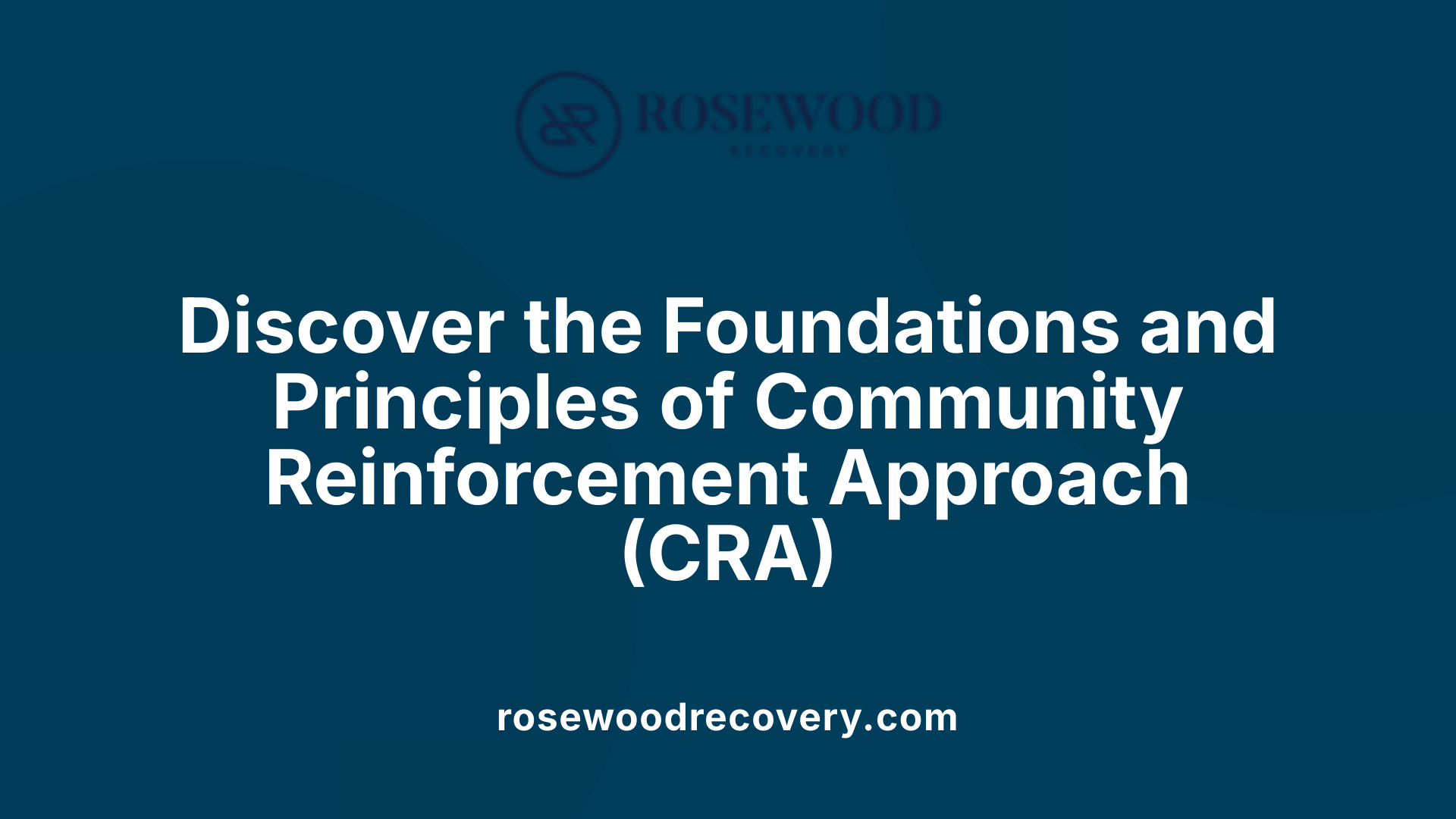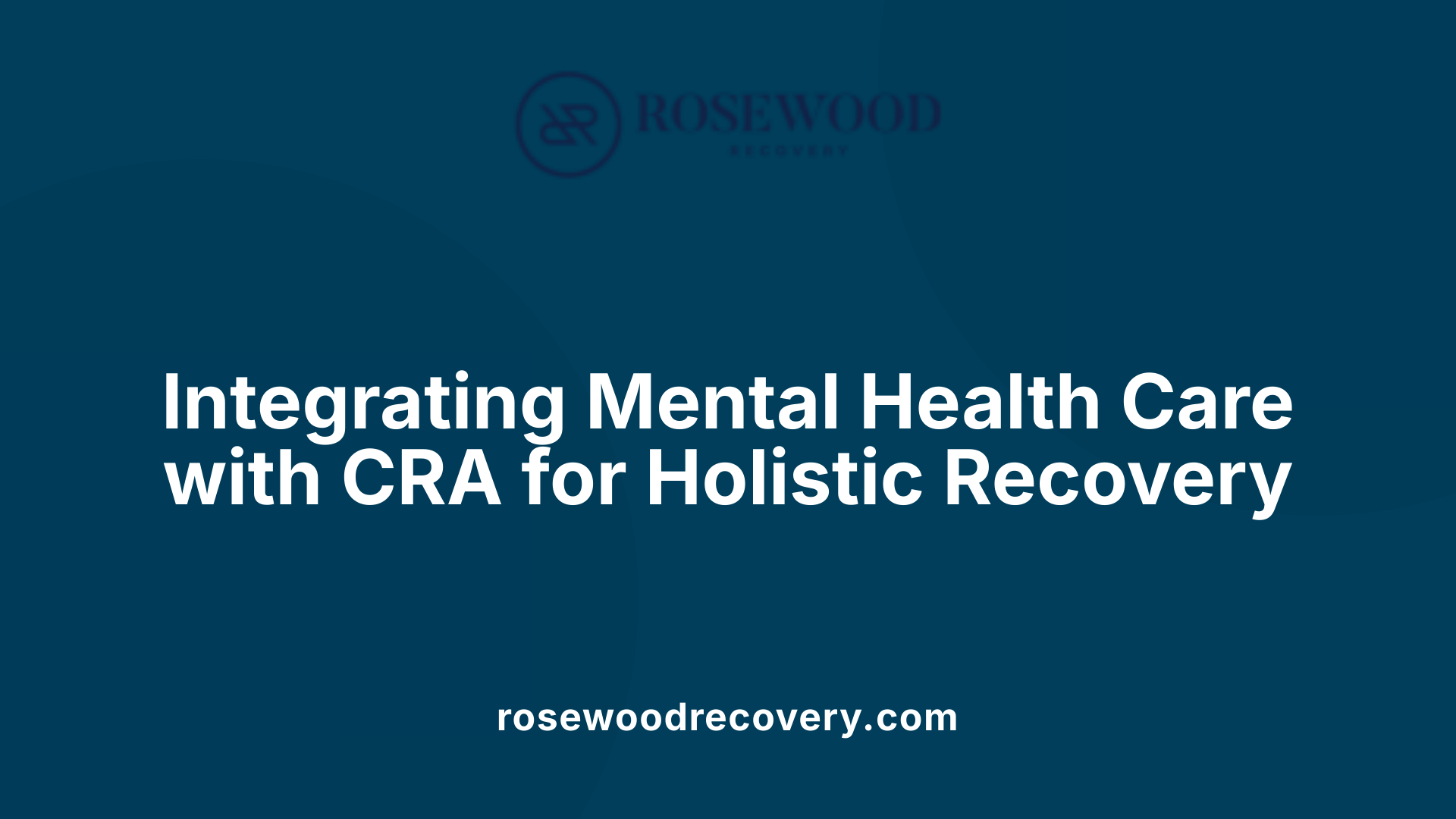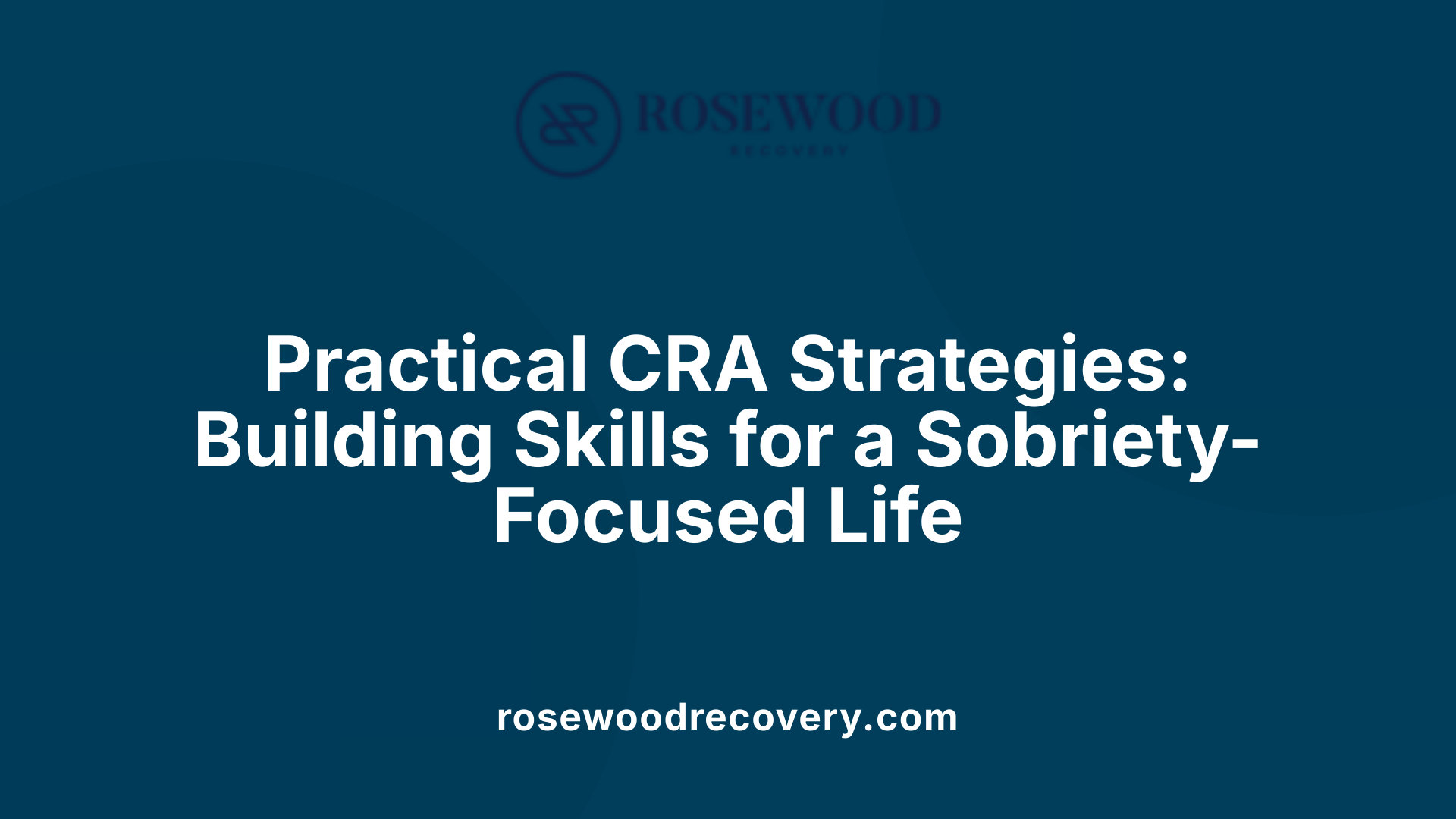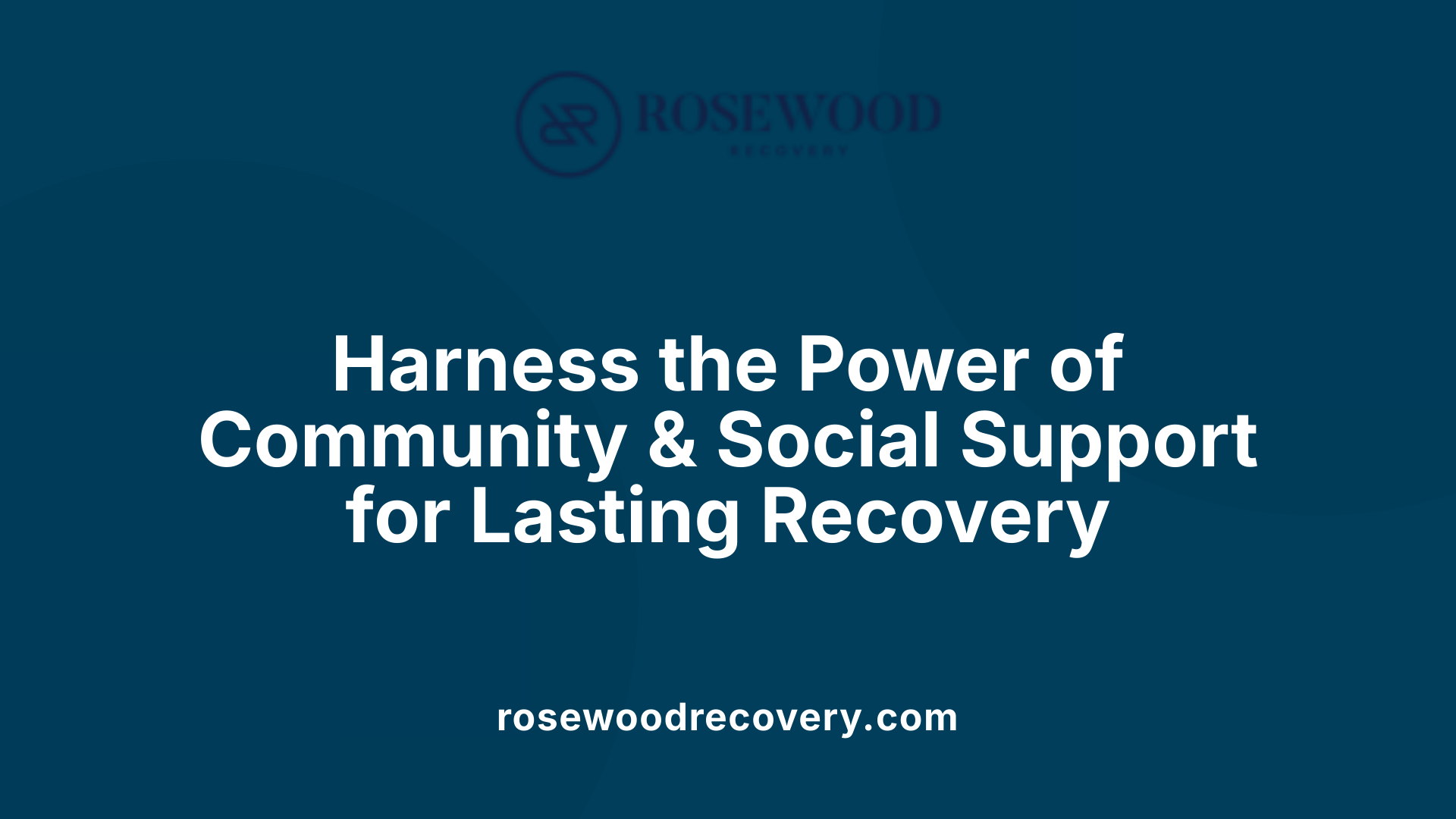Reimagining Addiction Treatment Through Community Empowerment
In the evolving landscape of substance abuse and mental health treatment, outpatient care stands out as an accessible and flexible option. Among the most effective strategies harnessed within this setting is the Community Reinforcement Approach (CRA), a comprehensive behavioral treatment that reshapes patients’ environments to foster recovery. This article explores the multifaceted benefits of community reinforcement in outpatient care, underscoring how it enhances treatment outcomes, supports mental health integration, and addresses diverse addiction types through evidence-based practices.
Understanding Comprehensive Treatment Services in Substance Abuse Care
What comprehensive treatment services are available for substance abuse?
Comprehensive treatment services for substance abuse offer a multifaceted approach to recovery. These services include medical detoxification to safely manage withdrawal symptoms, individualized counseling tailored to a person’s specific needs, and various behavioral therapies such as Cognitive Behavioral Therapy (CBT) and Community Reinforcement Approach (CRA).
CRA plays an important role by reinforcing sober behaviors through social, recreational, and vocational rewards, making sobriety more appealing than substance use. It works synergistically with other treatments, including medication-assisted therapies that address the biological aspects of addiction.
Treatment plans are carefully tailored to accommodate individual preferences, cultural backgrounds, and social environments. This ensures therapy remains relevant and effective across diverse populations. Family involvement and culturally sensitive practices often enhance engagement and outcomes.
Outpatient programs are a critical component of ongoing care. They typically provide medication-assisted treatment, case management, relapse prevention, and connections to peer support groups or 12-Step programs. Aftercare services aid in maintaining sobriety by fostering community integration and continuous support.
Together, these components create a holistic recovery pathway that addresses medical, psychological, social, and environmental factors influencing substance use disorders.
The Foundations and Principles of the Community Reinforcement Approach (CRA)

What behavioral theories underpin CRA?
CRA is grounded primarily in behavioral theory, especially operant conditioning, which focuses on modifying behavior through reinforcement. This approach helps patients replace substance use with healthier, rewarding activities by reshaping environmental consequences.
How do social and ecological systems contribute to CRA?
Social learning theory and ecological systems theory play crucial roles in CRA, emphasizing that recovery depends not only on individual behavior change but also on altering community and social networks to support sobriety. CRA targets the client's broader environment to encourage substance-free living.
What role do motivation and reinforcement strategies play?
Motivational enhancement techniques within CRA explore clients' ambivalence toward change and link recovery goals to personal values. Reinforcement strategies use positive social, vocational, and recreational rewards to make abstinence more appealing than substance use.
What are the core components of CRA?
Key elements include:
- Sobriety sampling: A trial abstinence period where patients experiment with short-term sobriety to build confidence.
- Functional analysis: Identifying triggers, benefits, and consequences of substance use to tailor interventions.
- Skills training: Teaching communication, problem-solving, and refusal skills to navigate social and high-risk situations effectively.
How does CRA integrate with other treatment modalities?
CRA is highly adaptable and can be combined with traditional treatments like detoxification, cognitive-behavioral therapy, and medication-assisted therapies. Its flexible framework enhances treatment outcomes by addressing multiple life domains alongside substance use.
The theoretical foundations and practical components make CRA a comprehensive, evidence-based approach that supports lasting recovery through behavior change and community reengagement.
CRA’s Impact on Quality of Life and Psychological Well-being
How Does CRA Improve Quality of Life in Addiction Treatment?
The Community Reinforcement Approach (CRA) significantly enhances the quality of life for individuals recovering from substance use disorders. A randomized controlled trial involving 60 inpatient drug addicts in Lahore, Pakistan, demonstrated that combining CRA with traditional Minnesota model treatment led to significant improvements across all domains measured by the WHOQOL-BREF scale: physical health, psychological health, social relationships, and environmental factors.
What Psychological Benefits Do CRA Participants Experience?
Participants receiving CRA reported notably higher levels of happiness compared to those undergoing only traditional treatment methods. This was assessed using the Happiness Scale, which evaluates satisfaction in areas such as relationships, emotional well-being, and personal hobbies. CRA’s focus on cultivating rewarding, substance-free activities directly supports these improvements in psychological well-being.
How Does Community and Recreational Engagement Factor Into CRA?
A central principle of CRA is restructuring patients' environments to favor sobriety. This involves increasing positive reinforcers such as social, vocational, and recreational engagement. By promoting involvement in community activities and healthy hobbies, CRA helps patients replace substance use with fulfilling alternatives, making abstinence feel rewarding rather than restrictive.
How Is the Happiness Scale Used in CRA Treatment?
The Happiness Scale serves as a practical tool within CRA to help clients assess satisfaction in multiple life areas. This aids therapists in identifying gaps in clients’ lives and tailoring interventions to boost motivation and create meaningful, positive changes that support sustained recovery.
What Are the Holistic Benefits of CRA?
Beyond abstinence, CRA fosters a well-rounded recovery by improving employment opportunities, social networks, communication skills, and relapse prevention techniques. This comprehensive approach contributes not only to reduced substance use but also to enhanced life satisfaction, resilience, and overall mental health.
| Aspect of CRA Impact | Measurement Tool | Outcomes Demonstrated |
|---|---|---|
| Quality of Life Improvement | WHOQOL-BREF | Significant gains in physical, psychological, social, environmental domains |
| Psychological Well-being | Happiness Scale | Higher happiness levels in CRA participants |
| Community Involvement | Social/recreational focus | Increased engagement in positive activities |
| Behavioral Assessment | Happiness Scale & functional analysis | Personalized treatment planning and motivation enhancement |
| Holistic Recovery Benefits | Various clinical outcomes | Improved employment, relationships, relapse prevention |
Addressing Mental Health in Substance Abuse Treatment with CRA Integration

How are mental health issues addressed in addiction treatment programs?
Addiction treatment programs address mental health issues through comprehensive and integrated strategies that combine psychiatric care, counseling, and medication management. Individuals with co-occurring disorders receive tailored therapies such as cognitive-behavioral therapy, motivational interviewing, and contingency management to develop coping skills and effectively manage dual diagnoses.
Multidisciplinary teams composed of psychiatrists, therapists, counselors, and medical professionals collaborate to coordinate both outpatient and inpatient care. This collaborative approach often includes outpatient mental health services, partial hospitalization, and medication-assisted treatments like buprenorphine or methadone, ensuring patients receive holistic support.
The Community Reinforcement Approach (CRA) complements these treatments by emphasizing behavioral therapies that reshape environmental influences and promote positive, sober reinforcement. CRA effectively addresses trauma and family dynamics, often integrating family-based interventions to enhance emotional well-being and recovery sustainability.
Programs providing such integrated care are community-oriented and accessible, supported by resources like FindTreatment.gov, which assists patients in finding local providers and understanding suitable treatment options. Together, these combined efforts offer a strong foundation for mental health stability alongside addiction recovery.
Efficacy and Versatility of CRA for Various Addiction Types

What types of addiction can be treated through comprehensive treatment services?
Comprehensive treatment services address a broad spectrum of addictions. These range from substance-related disorders—including alcohol, opioids (such as heroin and prescription painkillers), cocaine, nicotine, inhalants, stimulants, marijuana, and hallucinogens—to behavioral addictions like gambling and internet use. Treatments employ a mix of detoxification, counseling, medication-assisted therapy, and holistic practices such as yoga and art therapy. Programs also adapt to targeted populations like pregnant women, adolescents, and minority groups, ensuring that care is personalized and effective.
Treatment of alcohol, opioids, cocaine, and other substances with CRA
The Community Reinforcement Approach (CRA) is a robust behavioral therapy effective for alcohol, opioids, cocaine, and other substance use disorders. It helps individuals replace substance use with rewarding, sober activities supported by social and environmental reinforcers. CRA’s success is backed by extensive research, including randomized controlled trials showing improvements in quality of life, happiness, and sustained abstinence.
Addressing behavioral addictions and culturally diverse settings
CRA's focus on reshaping environments and behaviors makes it flexible enough to address behavioral addictions as well. Its applicability in various cultural and geographic settings is demonstrated through studies in diverse populations, like the inpatient trial in Lahore, Pakistan. This flexibility allows CRA to integrate well into both inpatient and outpatient programs worldwide.
Specialized CRA variants for adolescents (A-CRA) and families (CRAFT)
Specialized iterations of CRA adapt to specific groups. Adolescent Community Reinforcement Approach (A-CRA) includes family involvement and targets youth with cannabis and other substance use disorders effectively, proving cost-efficient and supportive of development. Community Reinforcement and Family Training (CRAFT) engages concerned family members, teaching them strategies to support treatment-resistant loved ones and their own wellbeing.
Adaptability and long-term effectiveness
CRA’s adaptability is reflected in its integration with other treatments such as cognitive-behavioral therapy and medication-assisted therapy. Long-term studies indicate sustained abstinence and improved psychosocial outcomes up to a year post-treatment. Its comprehensive nature, combining motivation, behavioral skills, social network enhancement, and relapse prevention, enhances durability and versatile application across addiction types and populations.
Practical Strategies Within CRA to Foster Sobriety and Life Skills

Functional Analysis and Assessment of Motivation
CRA begins with a detailed functional analysis of substance use, identifying triggers, benefits, and consequences for the individual. This assessment also gauges the client’s motivation for change, laying a foundation to tailor the treatment plan effectively.
Sobriety Sampling and Contingency Management
Clients participate in Sobriety Sampling, an initial trial abstinence period where they experiment with staying sober for manageable intervals. This technique boosts confidence and motivation. Concurrently, contingency management rewards positive behaviors like sobriety and counseling attendance, often through vouchers or community-based incentives that support sustained abstinence.
Communication, Problem-Solving, and Refusal Skills Training
CRA equips clients with essential social skills to navigate challenging situations. Training focuses on effective communication, problem-solving strategies, and assertive refusal skills to resist substance offers, enhancing social competence and reinforcing sobriety.
Job Skills, Social, and Recreational Counseling
Beyond direct sobriety techniques, CRA emphasizes developing life skills. Job skills training helps clients find or maintain employment, while social and recreational counseling encourages engagement in enjoyable, substance-free community activities, enriching their lifestyles and support networks.
Relapse Prevention as a Learning Process
CRA frames relapse not as failure but as an opportunity to learn. It involves identifying early warning signs and high-risk triggers, then developing personalized strategies to manage these situations. This proactive approach prepares clients to maintain long-term abstinence and resilience.
These strategies work collectively to restructure the client’s environment, making sober living more rewarding and sustainable over time.
The Role of Community and Social Networks in Enhancing Recovery

Building sober social networks
The Community Reinforcement Approach (CRA) emphasizes the importance of developing sober social networks that support recovery. By encouraging individuals to engage with peers and groups who practice substance-free lifestyles, CRA helps replace social environments that previously supported drug or alcohol use with healthier, sober communities.
Increasing positive reinforcement from community activities
CRA actively promotes participation in social, recreational, and community activities that serve as positive reinforcers. These activities provide enjoyable, meaningful outlets for individuals, making sobriety more rewarding than substance use. Engaging in these prosocial activities helps fill life with satisfaction and purpose, which supports long-term recovery.
Family involvement and emotional support
Family plays a crucial role in the recovery process. CRA integrates family counseling and emotional support into treatment to strengthen relationships disrupted by substance use. This involvement helps families better understand addiction and offers essential encouragement to the individual, promoting a supportive recovery environment.
CRAFT approach for concerned significant others
The Community Reinforcement and Family Training (CRAFT) is a specialized CRA variant aimed at concerned significant others (CSOs). CRAFT equips family members and loved ones with strategies to respond constructively to a person's substance use, encouraging treatment entry and maintaining their own emotional well-being. This non-confrontational, supportive approach improves treatment outcomes.
Promoting engaging recreational and vocational opportunities
CRA supports the development of vocational skills and recreational counseling, giving individuals opportunities to build competencies and find rewarding employment or hobbies. These avenues not only provide structure and purpose but also increase contact with positive social networks, further reinforcing substance-free living.
Overall, CRA’s focus on community and social support systems creates a comprehensive framework that nurtures recovery through meaningful connections and sustained positive reinforcements.
Combining CRA with Other Therapeutic Modalities for Outpatient Success
How does CRA integrate with Cognitive Behavioral Therapy (CBT) and family counseling?
CRA is highly adaptable and frequently combined with other therapeutic approaches such as CBT and family counseling. This integration enhances treatment by addressing both behavioral patterns and family dynamics. CBT complements CRA by focusing directly on changing thought patterns and coping skills, while family counseling strengthens the patient’s support network, which is pivotal for sustaining recovery.
How is CRA used alongside medication-assisted treatment?
CRA often supports medication-assisted treatment (MAT) by providing behavioral reinforcement and skills training that bolster adherence to medication schedules and overall treatment engagement. This combination has shown to improve treatment outcomes by merging the biological benefits of medication with CRA’s psychosocial interventions.
What about outpatient session scheduling and follow-up care?
Outpatient delivery of CRA offers flexibility in session frequency, typically spanning 24 weeks of active treatment followed by extensive aftercare. Sessions can be tailored to patient needs, allowing adjustments in intensity and duration. Regular follow-ups ensure continual progress, relapse prevention, and reinforcement of newly acquired skills.
What evidence supports the integration of CRA with other treatments?
Numerous NIH-funded clinical trials and systematic reviews corroborate CRA’s effectiveness both as a standalone and as part of integrated treatment plans. Research indicates that combining CRA with other modalities like CBT and MAT significantly enhances abstinence rates, retention, and psychosocial functioning.
How sustainable are treatment gains from CRA-supported outpatient programs?
Long-term studies reveal sustained abstinence and psychosocial improvements up to 12 months post-treatment. The emphasis on community involvement, skills development, and positive reinforcement helps maintain lasting recovery and improved quality of life over time.
Through its flexibility, comprehensive behavioral focus, and strong evidence base, CRA effectively complements other outpatient addiction therapies to promote durable treatment success.
Advancing Outpatient Care Through Community Reinforcement
The Community Reinforcement Approach embodies a transformative vision for outpatient addiction treatment, one that centers on reshaping an individual's environment to foster a rewarding, substance-free life. Supported by decades of rigorous research and clinical success, CRA’s emphasis on motivation, skill-building, community engagement, and comprehensive mental health integration offers a robust framework for sustainable recovery. When combined with other evidence-based therapies and tailored to diverse patient needs, CRA significantly enhances quality of life and psychological well-being. As outpatient care continues to evolve, community reinforcement modalities stand at the forefront, providing hope and tangible pathways toward long-term sobriety and holistic wellness.
References
- The effectiveness of the community reinforcement approach ...
- Community Reinforcement Approach
- What Are The Benefits Of Community Reinforcement Therapy?
- The Community Reinforcement Approach
- Community Reinforcement Approach (CRA)
- Community Reinforcement Vouchers Approach › Program ...
- The Community Reinforcement Approach: An Update of ...
- What is Community Reinforcement Approach ?
- Community Reinforcement Approach



.jpeg)
